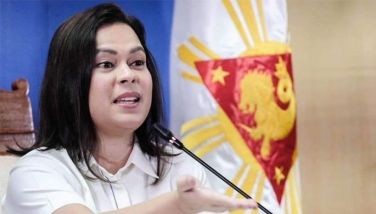Better relations

Yuletide is also a season of farewells – to a year that is ending, and to people ending their assignments in the Philippines.
Tomorrow the ambassador of China, Liu Jianchao, leaves his post in Manila and returns to Beijing while waiting for the formal confirmation of his next assignment.
Ambassador Liu is returning to his country just a few months before President Hu Jintao steps down from power – an approaching event that is being closely watched around the world.
Human rights advocates see a China that is unyielding to calls for democratic reforms. Press groups consider the country as the world’s biggest prison for journalists, with tough controls on mass media and the Internet including social media. It is the only country where email that I receive regularly from civil rights groups do not reach me, and where certain types of information on the Internet are blocked.
But in many other aspects, China has changed dramatically since Deng Xiaoping started undoing the damage from Mao Zedong’s Cultural Revolution.
I know journalists who started their own private media enterprises in China (one of them is now a huge success). Even when they were just starting out a few years ago, they told me that they could criticize public officials and expose anomalies and government wrongdoing, although up to a certain extent: the military and the Central Committee of the Communist Party of China remained off-limits.
The dramatic changes are evident in financial and economic matters as well as the way China deals with the world.
I’ve always seen Ambassador Liu as an embodiment of the dizzying changes in his country. Oxford-educated, proficient in English and articulate, media-savvy, in his late 40s, he is by far the most open of all the ambassadors sent here by Beijing. When he doesn’t want to answer a question, he honestly says that he can’t, with a promise that he’ll come up with a reply soon, instead of lying like some diplomats of democratic countries do. He is trusting enough to give off-the-record information.
I’ve always suspected that Liu, a former spokesman for China’s foreign ministry, was deployed here for damage control.
He arrived here when bilateral relations had been strained by the corruption scandals involving ZTE Corp., one of China’s largest multinationals, and the North Rail project.
The two scandals eventually became the least of Liu’s worries. During his posting here, eight Hong Kong tourists were killed in a hostage incident in Rizal Park, three Filipino drug mules were executed in China (with another one this year), and there was a string of hostile incidents involving the two countries in the Spratlys.
Liu’s troubles started right at his official residence in Dasmariñas Village, where guards at the gates routinely tell visitors to the Chinese compound that the address doesn’t exist. Maybe Vice President Jejomar Binay, who’s in charge of these subdivision matters and whose son is mayor of Makati, should look into this problem, which has also been experienced by embassies of several other countries in Dasmariñas.
Maybe it’s time for the Chinese to move up in the world, to neighboring Forbes Park, befitting its status as the world’s second largest economy. If China’s top diplomat here can be one of just three ambassadors (the two others are Japan and new member South Korea) who can afford the stratospheric regular membership fee in the Manila Golf Club, Beijing can afford housing for its diplomats in Forbes Park.
* * *
New arrangements befitting its prosperity and “peaceful rise” have been cited by Beijing in its continuing military buildup, which is viewed by its neighbors and other countries with wariness.
China’s behavior in the South China Sea, which it is claiming in its entirety as part of its territory, is being watched by the world for clues on its future behavior as a member of the international community.
The jitters increased when President Hu recently told the Chinese navy to speed up modernization and be ready for warfare.
Beijing has maintained that it has no intention of becoming a superpower to rival the United States, insisting that the superpower concept is so 20th century. Beijing has said it needs to develop credible military defense capability commensurate with its economic power.
Liu, who visited our office last week to bid us goodbye, reiterated this message of China’s “peaceful rise.”
Peace has allowed China to prosper since the time of Deng Xiaoping. Liu pointed out that the South China Sea is where the bulk of his country’s exports and imports pass, and it is in China’s interest to maintain peace in those waters.
“We don’t want war, we don’t want conflict,” Liu said.
He emphasized that finding a solution to the territorial dispute would be “really difficult in the near future.” For now, he said, China would be sticking to its proposal for joint exploration and setting aside territorial differences to maintain peace and stability in the area.
His successor, a woman, will be inheriting this conflict and is not expected to veer from this position.
* * *
Despite the conflict, Liu said his stint in the Philippines has been full of good memories.
The steep membership in Manila Golf has not been wasted. “I started as someone who didn’t know what a handicap is,” he told us. Now his handicap is 22 or 23.
He is looking forward to his new posting. But even in his new assignment, he said, he would continue working to move Philippine-Chinese relations forward.
Liu hopes to see improvements in both private-to-private and government-to-government economic partnerships between the two countries, and two million tourists on both sides.
He is optimistic that by the end of President Aquino’s term, all project commitments would be fulfilled.
“It’s been a learning curve,” Liu said. “I do believe the relationship can evolve and it has very, very good prospects.”
- Latest
- Trending
























